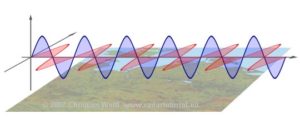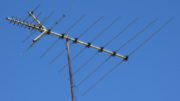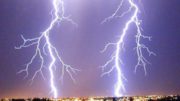weIf they do, you probably have bigger issues. Yes, it’s true that LTE signals from local cell towers can interfere with TV antenna reception. This is because LTE is now carried on frequencies that used to be used for television, and so if an antenna isn’t designed to block those signals there can be problems. But the opposite is almost never true.
A little bit technical

TV antenna signals and cellular signals are very different in some ways. It’s true that the range that used to be known as channels 37-69 now contains blocks that are used by cell phones. The original plan for television in the US allowed for 83 different frequencies. With today’s technology, no city or town needs more than about 25, and very few need that many.
Television antennas are, in general, wide and flat. That’s because television broadcast waves go from side to side. We call this “horizontal polarization.” Cell phone antennas, on the other hand, are designed to pick up waves that go up and down. We call this “vertical polarization.” One benefit of these two different plans is that horizontally polarized and vertically polarized signals don’t interfere with each other as much as if all the signals went the same way.
That’s got to give you some confidence that TV signals aren’t going to interfere with cell signals in most cases.
How interference could happen
In order for a TV signal to interfere at all with a cell signal, it would have to first and foremost be stronger than that cell signal. Realistically for that to happen you would need to be in direct line of sight of a TV antenna a mile or so away. TV signals are stronger than cell signals, that’s true, but because of some physics stuff that I don’t want to get stuck in, all broadcast signals lose a lot of power in a very short distance away from the broadcast source. This is true whether it’s a cell signal, a TV signal, or even the signal from a remote control. So if you’re at the point where the TV signal is stronger than a cell signal, you’re probably quite close to that TV signal.
Second thing you need to know is that cell signals are higher in frequency than TV signals, making it less likely that there will be interference. Cell antennas are designed to pull in the very narrow frequency ranges that cell phone providers use and they aren’t very good at pulling in any other sorts of signals… that’s by design. Every millimeter in a cell phone counts. When you look at a phone, there simply isn’t room for parts with no function. So what I’m saying here is that yes, some TV antennas can pick up cell signals. By and large cell antennas can’t pick up TV signals very well at all.
It’s a very safe and well-designed system
Finally, you can sleep safely knowing that all these signals are, in truth, extremely weak. We’re talking ten-thousandths of a watt here. It’s pretty amazing that you can receive them at all. On the other hand, we have been researching antenna science for about 150 years. So, we have a pretty good idea what we are doing.
In the United States, the Federal Communications Commission licenses all radiation sources. They work hard to make sure that devices and broadcasters don’t interfere with each other. Although it’s easy to pick on them for other things, they do a surprisingly good job at this. That’s the real reason you can sleep soundly knowing that you won’t have this sort of problem.
In the meantime though, if you need a TV antenna, cellular antenna, or anything else to live your best digital life, I hope you’ll consider shopping at Solid Signal. With over 40,000 parts designed to work together in the world, you’re sure to find what you need!





